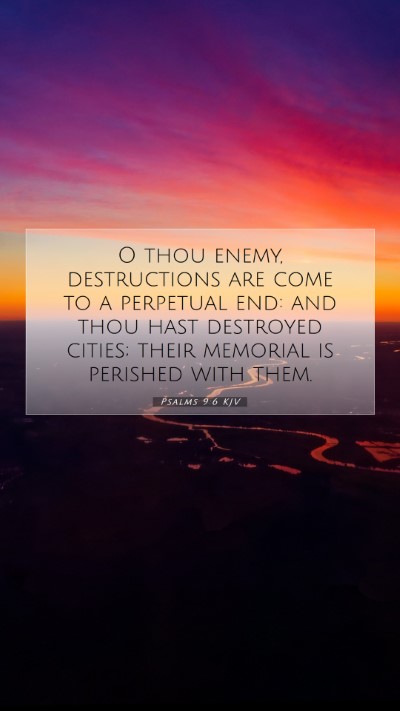Psalms 9:6 Explained
Psalms 9:6 states:
"O enemy, destructions are come to a perpetual end: and thou hast destroyed cities; their memorial is perished with them."
This verse captures the essence of divine justice and the ultimate judgment of adversaries. Below is a detailed examination of its meanings and implications derived from public domain commentaries by Matthew Henry, Albert Barnes, and Adam Clarke.
Verse Context and Overview
This verse finds itself within a psalm of David, who expresses gratitude for God’s deliverance as well as a prophetic assurance of the eventual triumph over enemies.
Key Themes
- Divine Justice: The verse emphasizes God’s retribution against those who oppose his people.
- End of Oppression: It brings assurance that the oppressors will meet their end.
- Historical Judgment: Echoes the historical destruction of cities, signifying that their nemeses will not live on.
- God's Sovereignty: A reminder of God's ultimate authority over the earth.
Bible Verse Meanings and Interpretations
In this psalm, there is a clear engagement with the concepts of
Bible verse meanings and Bible verse interpretations. The poet delves into the contrast between the temporary triumphs of the wicked and the everlasting nature of God's power and judgment.
Matthew Henry's Commentary
Matthew Henry points out that this verse illustrates the finality of God's justice. He notes that the ‘enemy’ refers to those who invariably oppose God’s will. The ‘perpetual end’ signifies that their ruin is not momentary but absolute, contrasting the temporary victories of sin with the eternal decrees of God.
Albert Barnes' Views
In Albert Barnes' commentary, he draws attention to the destructive nature of the enemy's actions and their subsequent demise. He emphasizes that God allows for the ruins of cities and the fading of memories as a testament to His righteousness. The enduring message here serves as a warning against opposition to divine authority.
Adam Clarke's Analysis
Adam Clarke elaborates on the historical context of Scripture analysis, referring to the destruction faced by oppressors throughout Israel's history. He notes that while the wicked may have power temporarily, their legacy is one of destruction, which God ultimately ends. Clarke ties this verse to the assurance of hope for God’s people.
Understanding Scripture through Historical Context
This verse can also be understood through its historical context. The fall of cities often signifies not just physical destruction but also the obliteration of the adversaries’ legacies and identities. Understanding difficult Bible passages often begins with such historical insights.
Cross References
- Isaiah 26:14 - "They are dead, they shall not live; they are deceased, they shall not rise..."
- Revelation 20:10 - "And the devil that deceived them was cast into the lake of fire..."
- Psalm 37:10 - "For yet a little while, and the wicked shall not be..."
- Proverbs 10:27 - "The fear of the Lord prolongs days, but the years of the wicked will be shortened."
Application of Psalms 9:6 in Daily Life
Understanding this verse allows individuals to reflect on the application of Bible verses to daily life. It encourages believers to trust in God’s provision and justice, reassured that while they may face opposition, God's reign ultimately prevails.
Bible Study Insights
For those engaged in Bible study groups or online Bible study, this verse serves as a powerful reminder of God's sovereignty. It can be explored further with related study materials and Bible study lessons that delve into the consequences of moral choices and the nature of divine justice.
Conclusion
Psalms 9:6 is a profound declaration of faith in the ultimate supremacy of God's justice over chaos caused by human rebellion. By tapping into resources such as Bible study tools and Bible study resources, believers can deepen their Bible verse understanding and foster a more robust interpretation of Scripture.


